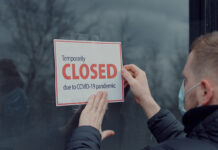All central belt premises to close for fortnight at 6pm this Friday
Tougher restrictions for rest of Scotland will also see no alcohol sales indoors

ALL pubs, bars and restaurants across Scotland’s central belt will have to close their doors from 6pm this Friday (October 9) until Monday October 26, the first minister has announced.
Speaking in the Scottish Parliament first minister Nicola Sturgeon announced a raft of new measures amid rising COVID-19 infection rates. Among them she stated that all licensed premises in five health board areas (with the exception of hotel restaurants for residents) must close their doors, operating only on a takeaway basis. That rule will apply to all premises in the Greater Glasgow & Clyde, Lanarkshire, Ayrshire & Arran, Lothian and Forth Valley health board areas.
In all other parts of Scotland premises can remain open during that period, but with added restrictions.
Indoor areas can only open between 6am and 6pm for the sale of food and non-alcoholic drinks, with alcohol sales only permitted in outdoor areas. Outdoor areas can remain open till 10pm.
There is an exemption for “celebrations associated with specific life events such as weddings that are already booked and funerals”.
The new steps follow the publication of an evidence paper on infection rates. The paper can be viewed here.
A £40 million fund will be made available to businesses affected by the new rules. Details of that fund will be announced in the coming days.
“I know the vast majority of pubs, bars and restaurants and bars have worked exceptionally hard over the past few months to ensure the safety of their staff and customers and I’m deeply grateful to them for that and I know how tough these – albeit temporary – restrictions are for the hospitality sector,” said Sturgeon.
“But the evidence paper published today sets out why these settings present a particular risk. The R Number seems to have risen above 1 approximately three weeks after the hospitality sector opened up and we know that more than one fifth of people contacted by Test & Protect report having visited a hospitality setting. It doesn’t absolutely mean that is where they got the virus but it does show that these settings pose a particular risk of transmitting the virus.”
Scottish Licensed Trade Association chief executive, Colin Wilkinson, called the announcements “cataclysmic” for the industry.
“Industry figures suggest that there are very low infection rates of staff within our pubs and bars which suggests to us that the industry is doing everything that it can and is providing as safe an environment as possible – otherwise, if we were a major causal route of infection, this would surely be reflected in the infection rate of hospitality staff,” said Wilkinson.
“It would appear again that Scotland’s licensed trade is the sacrificial lamb and paying the price for other sectors that do not operate under such restrictive measures as we have seen recently.”
UK Hospitality executive director for Scotland, Willie Macleod, said the new measures are “a total catastrophe”.
“Forced closures will spell the end for many, many venues which have no cash flow and will have exhausted their reserves,” said Macleod.
“Severe restrictions to those businesses not forced to close will amount to a closure for many. It is likely to be the final straw for many that were only just hanging on. We are going to see businesses fold and many jobs lost.”
And Stephen Montgomery, spokesman for the Scottish Hospitality Group, said the first minister has “effectively signed a death sentence for many businesses across the Scottish hospitality industry”.
“This latest blow from the Scottish Government will create fear and anger across our industry,” said Montgomery.
“This is not a ‘short, sharp shock’, rather a crippling stranglehold that will result in many Scottish pubs and restaurants unable to reopen in lockdown areas if this becomes indefinite.
“While some premises may remain open, banning alcohol indoors will mean that many smaller businesses, family operated and at the heart of local Scottish communities, will not survive past winter and the longer-term impact will be felt for years to come.”























